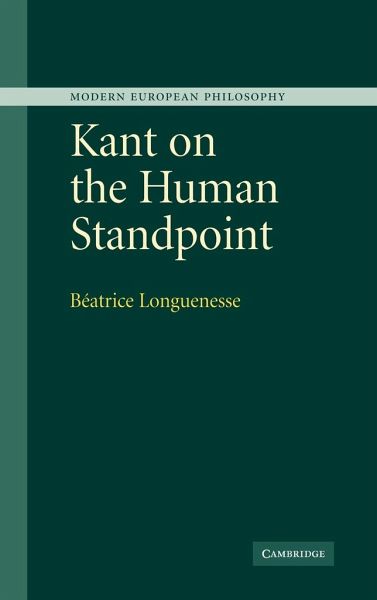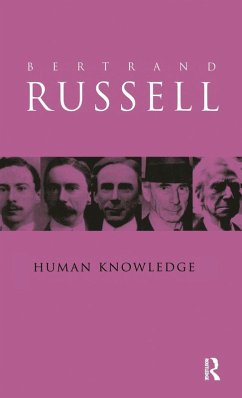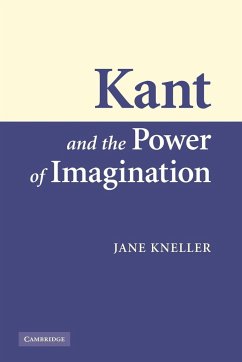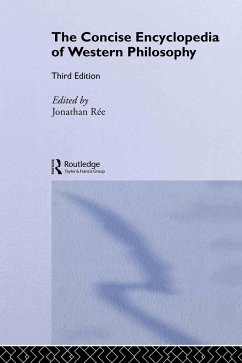
Kant on the Human Standpoint

PAYBACK Punkte
52 °P sammeln!
Short description/annotationKant's philosophy considered under one unifying standpoint: his conception of our capacity to form judgments.Main descriptionIn this collection of essays Béatrice Longuenesse considers the three aspects of Kant's philosophy, his epistemology and metaphysics of nature, his moral philosophy, and his aesthetic theory, under one unifying standpoint: Kant's conception of our capacity to form judgments. She argues that the elements which make up our cognitive access to the world - what Kant calls the 'human point of view' - have an equally important role to play in our m...
Short description/annotation
Kant's philosophy considered under one unifying standpoint: his conception of our capacity to form judgments.
Main description
In this collection of essays Béatrice Longuenesse considers the three aspects of Kant's philosophy, his epistemology and metaphysics of nature, his moral philosophy, and his aesthetic theory, under one unifying standpoint: Kant's conception of our capacity to form judgments. She argues that the elements which make up our cognitive access to the world - what Kant calls the 'human point of view' - have an equally important role to play in our moral evaluations and our aesthetic judgments. Her discussion ranges over Kant's account of our representations of space and time, his conception of the logical forms of judgments, sufficient reason, causality, community, God, freedom, morality, and beauty in nature and art. Her book will appeal to all who are interested in Kant and his thought.
Table of contents:
Introduction; Part I. Discussions: 1. Kant's categories and capacity to judge; 2. Synthetics, logical forms, and the objects of our ordinary experience; 3. Synthetics and givenness; Part II. The Human Standpoint in Kant's Transcendental Analytic: 4. Kant on a priori concepts: the metaphysical deduction of the categories; 5. Kant's deconstruction of the principle of sufficient reason; 6. Kant on causality: what was he trying to prove(?)33;; 7. Kant's standpoint on the whole: disjunctive judgment, community, and the Third Analogy of Experience; Part III. The Human Standpoint in the Critical System: 8. The transcendental ideal, and the unity of the critical system; 9. Moral judgment as a judgment of reason; 10. Kant's leading thread in the analytic of the beautiful.
Kant's philosophy considered under one unifying standpoint: his conception of our capacity to form judgments.
Main description
In this collection of essays Béatrice Longuenesse considers the three aspects of Kant's philosophy, his epistemology and metaphysics of nature, his moral philosophy, and his aesthetic theory, under one unifying standpoint: Kant's conception of our capacity to form judgments. She argues that the elements which make up our cognitive access to the world - what Kant calls the 'human point of view' - have an equally important role to play in our moral evaluations and our aesthetic judgments. Her discussion ranges over Kant's account of our representations of space and time, his conception of the logical forms of judgments, sufficient reason, causality, community, God, freedom, morality, and beauty in nature and art. Her book will appeal to all who are interested in Kant and his thought.
Table of contents:
Introduction; Part I. Discussions: 1. Kant's categories and capacity to judge; 2. Synthetics, logical forms, and the objects of our ordinary experience; 3. Synthetics and givenness; Part II. The Human Standpoint in Kant's Transcendental Analytic: 4. Kant on a priori concepts: the metaphysical deduction of the categories; 5. Kant's deconstruction of the principle of sufficient reason; 6. Kant on causality: what was he trying to prove(?)33;; 7. Kant's standpoint on the whole: disjunctive judgment, community, and the Third Analogy of Experience; Part III. The Human Standpoint in the Critical System: 8. The transcendental ideal, and the unity of the critical system; 9. Moral judgment as a judgment of reason; 10. Kant's leading thread in the analytic of the beautiful.














